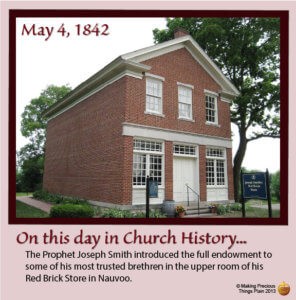The term “endowment,” as generally used in the world, means a gift, usually money, bestowed upon an individual or an institution. It is not an ordinary gift; it is usually very large or significant and continues to bless the recipient “in perpetuity”—essentially forever.
It is significant, then, that the Lord chose to call what He bestows on His children in the temples “an endowment.” This endowment is a gift of knowledge, protection, and power that is beyond price. The Prophet Joseph Smith said: “You need an endowment . . . in order that you may be prepared and able to overcome all things” (History of the Church, 2:309). The knowledge and power a temple endowment bestows come directly from our Heavenly Father (see D&C 38:32, 38; D&C 43:16). And these blessings last forever, not just in this world.
A form of endowment was bestowed in the Kirtland Temple—washings and anointings, similar to those given to the priests in Moses’ day. But these were only “initiatory” ordinances to prepare for even greater ones. It was not until Nauvoo that the Prophet could receive and introduce them to the Church.
On January 19, 1841, the Lord indicated that He would “reveal unto my church things which have been kept hid from before the foundation of the world,” which “pertain to the dispensation of the fulness of times” (D&C 124:41). He said he would “show unto my servant Joseph all things pertaining to this house, and the priesthood thereof” (D&C 124:42).
These were the sealing ordinances, which are associated with the power to bind or loose on earth and in heaven, sometimes referred to as the sealing power. It includes a number of ordinances and covenants that are associated with exaltation. Then, when these have been received, one can be “sealed” to his or her companion for time and all eternity, along with their children.
Knowing that the Prophet would be taken in death before the Nauvoo Temple was finished, the Lord commanded him to make known to his most trusted brethren these ordinances, which would later be performed in the temple after it was finished. Thus, on May 4, 1842, Joseph introduced the full endowment to Hyrum Smith, Brigham Young, Heber C. Kimball, Willard Richards, Newel K. Whitney, and others—and later to their wives.
All of these endowments were given in makeshift circumstances, outside the temple. The upper room of Joseph’s Red Brick Store was used, as was an upper room in the Mansion House—Joseph and Emma’s home and hotel.

